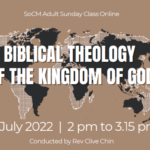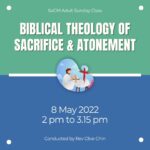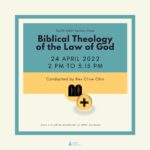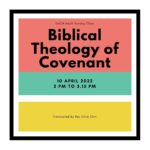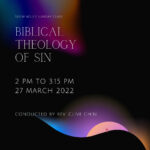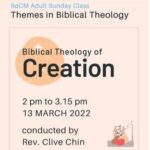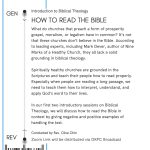Biblical Theology (Page 2)
Kingdom of God
- 10 Jul 2022
- Biblical Theology
- Recording
- Presentation
-
The Bible from beginning to end portrays God as the sovereign Lord over all things. He reigns as both
creator and sustainer of all that exists, especially over human affairs.Unfortunately, Adam and Eve rebelled against God’s authority as king with severe consequences for the history of humanity. From this catastrophic beginning in Gen 3, the Bible reveals how God gradually re-establishes his rule over the whole earth by redeeming humanity and his creation.
When Jesus arrived, he inaugurated a spiritual kingdom (Mk 1:15), yet he taught us to pray for a time
(Matt 6:10), when he will return in glory as universal king to restore his kingdom on earth (Rev 20-22). It is, therefore, very important for Christians to understand God’s plan of salvation and see how we
can be part of the grand narrative of God’s kingdom rule on earth.
Biblical Theology of Exile & Exodus
- 22 May 2022
- Biblical Theology
- Recording
- Presentation
-
The terms “exodus” and “exile” refer specifically to two historical events in the life of the nation of Israel. The former indicates Israel’s release from bondage in Egypt. The latter refers to Israel being carried off in the Assyrian and Babylonian deportations. However, these themes are also used in the broader theological context of the Bible’s storyline.Exile, more broadly, signals a broken relationship between God and his people. Exodus, on the other hand, promises to restore Israel’s relationship with Yahweh and to return her to the land of their forefathers. In this lesson, we will examine how these themes relate to the gospel message of Jesus Christ.
Biblical Theology of Sacrifice & Atonement
- 8 May 2022
- Biblical Theology
- Recording
- Presentation
-
Sacrifices were a regular part of life in ancient Israel. People offered them not only at regular annual festivals (Lev 16; 23), but also throughout the year in response to sin (Lev 4-5) or for answered prayer (Ps 66:13-16). As a result, almost every OT book mentions sacrifice.
In this lesson, we will be introduced to the main types of animal sacrifices and their functions. In particular, the concepts of atonement and blood will be highlighted, which ultimately point to the sacrificial death of Jesus Christ onthe cross.
Biblical Theology of The Law of God
- 24 Apr 2022
- Biblical Theology
- Recording
- Presentation
-
When people think about the term “law” today, we normally understand it as a system of rules that regulate human behaviour within a country or community. While this understanding of law occurs in the Bible, the word “law” is also used in other ways. The term “law” translates the Greek and Hebrew words nomos or torah, respectively. However, these terms mean different things in different OT and NT contexts. That’s why it is important to understand the law or instruction of God within the overall context of the Bible. For example, what did Jesus mean when he said, “Do not think that | have come to abolish the Law or the Prophets; | have not come to abolish them but to fulfil them” (Matt 5:17)?
Biblical Theology of Covenant
- 10 Apr 2022
- Biblical Theology
- Recording
- Presentation
-
The idea of “covenant is a very important concept in biblical theology. The concept exists at significant turning points in the Bible’s storyline and is the theological glue that binds God’s promise to fulfilment.
Although the Bible does not explicitly mention a covenant until Gen 6:18, when God announces that he intends to establish a covenant with Noah, many believe that God made a covenant with Adam (cf. Hos 6:7).
In this lesson, we will discuss the major divine-human covenants, including Noahic, Abrahamic, Mosaic, Davidic, and the New covenant, in terms of how they support and advance God’s redemptive plan.
Biblical Theology of Sin
- 27 Mar 2022
- Biblical Theology
- Recording
- Presentation
-
It is hard to avoid the conclusion that there is something fundamentally wrong with the world. Of course, every world religion has its own diagnosis of the problem. So, it is
important to get the right diagnosis before offering the proper prescription. According to Christianity our biggest problem is sin. What exactly is sin, particularly in view of the
fact that there are more than fifty different terms used in the Bible to describe this problem? In our study of the biblical theology of sin, we will consider its nature, the personal, social, and cosmic consequences of sin, and God’s offer of salvation in Jesus Christ.
Biblical Theology of Creation
- 13 Mar 2022
- Biblical Theology
- Recording
- Presentation
-
How did the world come to be?
Where is it headed?
Every civilization or world regligion offers answers to these and other questions.
In this lesson on the Biblical Theology of Creation, we consider the message fo the book of Genesis on such matters as the meaning of creation, time, and history.
The lesson focuses on the Bible’s teaching on sin, judgement and new creation, particularly with reference to the role of Jesus Christ and the apocalyptic vision of a new heaven and earth
How to read the Bible – Part 2
- 27 Feb 2022
- Biblical Theology
- Recording
- Presentation
-
How to read the Bible in Context?
What do churches that preach a form of prosperity gospel, moralism, or legalism hasve in common? It’s not that these churches don’t believe in the bible. According to leading experts, including Mark Dever, author of Nine Marks of a Healthy Church, they all lack a solid grounding in Biblical Theology
Spiritually healthy churches are grounded in the Scriptures and teach their people how to read properly Especially when people are reading a long passage, we need to teach them how to interpret, understand, and apply God’s word to their lives.
In our first two introductory sessions on Biblical Theology, we will discuss how to read the Bible in context by giving negative and positive examples of handling the text.
How to read the Bible – Part 1
- 13 Feb 2022
- Biblical Theology
- Recording
- Presentation
-
How to read the Bible in Context?
What do churches that preach a form of prosperity gospel, moralism, or legalism hasve in common? It’s not that these churches don’t believe in the bible. According to leading experts, including Mark Dever, author of Nine Marks of a Healthy Church, they all lack a solid grounding in Biblical Theology
Spiritually healthy churches are grounded in the Scriptures and teach their people how to read properly Especially when people are reading a long passage, we need to teach them how to interpret, understand, and apply God’s word to their lives.
In our first two introductory sessions on Biblical Theology, we will discuss how to read the Bible in context by giving negative and positive examples of handling the text.

